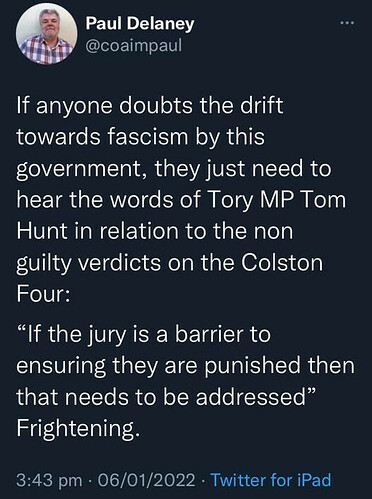Do you have to be so unpleasant about this? Surely I am entitled to my opinion.
I’m not being unpleasant about it and yes, you are entitled to your opinion.
You are not entitled to have my agreement though.
Everyone can have their opinion on whether they think the jury made a mistake or not but that is based purely on the reporting of the trial in the media as none of us were inside the courtroom nor have we seen the full transcript of the evidence etc.
And even if you had seen all of the above jury deliberations are sealed, so you still would not know exactly why the jury decided as they did.
Seeing the evidence would have been good though. 
The more I read about it, the clearer it gets that it’s the jury system itself that is now under attack by the right. This just about sums it up:
Apply for the transcript.
Yup.
Interesting thoughts here on the issue discussed above of reparations for slavery and colonialism:
Is there a sliding scale for payments?
Obviously, Britain, while benefiting hugely from slavery, did put an end to it quite early and then policed the world’s oceans against the slave trade ever since.
Will the sub-Saharan tribes that enslaved the survivors of the continuous wars with their neighbours be made to pay something?
What about the North Africans which actually sold these unfortunate folk to any passing merchant with a few coins in their purses and spaces in their ship’s holds?
France was the third largest slave trading nation and still clings onto it’s colonial past with no sign of granting independence to the various islands etc that it controls. IMO if France doesn’t want to let go then it should at least help the local populations progress rather than live in the squalor and poverty that they do now.
Do you mean the DOM? If so remember they aren’t colonies or territories in the way eg Hong Kong was, they are an integral part of France.
They may be an integral part of France but they’re totally ignored when it comes to government investment.
Did you read the linked article NotALot?
The proposal is simply to correct anomalies in the allocation of SDRs (Special Drawing Rights) which continue to discriminate against former enslaved/colonised peoples - it would redress some historical and continuing injustice with little impact on the former slave holding and trading nations. The issues you raise are not relevant to it.
A couple of forthcoming books very relevant to the issues discussed in this thread…
Maybe indications that, as the implications of the BLM movement slowly filter through our lives, the UK is finally starting to come to terms with it’s history of slavery and colonialism?
Simple acknowledgement that much of the UK’s wealth came from slavery and colonialism won’t really change racial inequality though.
Not in itself, I agree.
Both of these books are forthcoming, so I haven’t read them yet. The former, Capitalism & Slavery, has been available in other countries for decades, but, although written in the UK about the UK, was never published there because it was seen as “contrary to the British tradition” - ie. the mythologised version of British history!
But they are examples of many research efforts - the very positively reviewed White Debt also springs to mind - exposing in some detail the specific capitalist nature of racial slavery, how it made possible not just the direct accumulation of wealth and inequality that is still extant, but also the industrial revolution itself - ie. the majority of all the wealth of modern Britain (and other developed countries) - and how it also shaped the racism we see today.
Perhaps more importantly, they are also unraveling the myth that philanthropic liberal white men ended slavery - revealing that the main factors in the defeat of racial slavery over a hundred years or so were in fact the resistance of the enslaved people themselves, and market developments that were making it much less financially viable anyway.
Hopefully, as these insights percolate through society, they will help end racial inequality in future.
